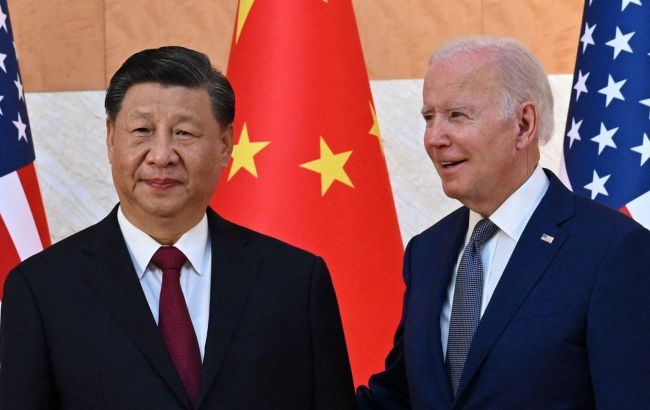Biden and Xi key agreements: AI, military cooperation
 Photo: Chinese and US presidents Xi Jinping and Joe Biden (Getty Images)
Photo: Chinese and US presidents Xi Jinping and Joe Biden (Getty Images)
The meeting of US President Joe Biden with his Chinese counterpart Xi Jinping in San Francisco on November 15 lasted more than four hours. According to the results, the leaders of the countries concluded several agreements, and also discussed the topic of the Russian Federation's war against Ukraine and the situation around Taiwan, reports Bloomberg.
During yesterday's meeting on the sidelines of the Asia-Pacific Economic Cooperation (APEC) summit, Biden and Xi tried to stabilize relations between countries strained by economic competition and "military and diplomatic mistakes."
Yes, the material notes, both of them had reasons to develop a relationship. In particular, the leader of the People's Republic of China is struggling with the economic crisis in the country: foreign investors are worried about difficult relations with the world's largest economy. And Biden is "trying to stabilize the global situation on the eve of the elections, which will require his attention domestically."
As a result, the heads of the US and China were able to conclude several significant agreements during long discussions in San Francisco (California) on Wednesday.
Working group on the fight against drugs
The two countries will strengthen cooperation in the fight against drugs. China has agreed to crack down on the supply of fentanyl's chemical ingredients and pill presses, bypassing existing restrictions.
Xi and Biden also agreed to coordinate the policies and actions of law enforcement agencies in the future.
As stated in the US, this work will deal with "the fight against the global illegal production and trafficking of drugs" based on fentanyl.
Restoration of military communication
Washington and Beijing agreed to resume high-level military-to-military talks. Biden and Xi pledged to keep an open line of communication with each other as issues arise.
It is planned to resume regular consultations with US Defense Secretary Lloyd Austin, as well as Sino-U.S. talks on defense policy coordination and the Sino-U.S. Military Maritime Consultative Agreement.
Such changes should mean the return of meetings and telephone conversations between theater commanders and "reduce the chance of mistakes", the parties say.
Dialogue about AI
The United States and China have agreed to create a working group to start a dialogue on artificial intelligence (AI), with Washington stressing the need to improve protections for new technologies.
As a senior administration official previously stated, the White House is concerned about China's use of AI, particularly for military purposes. Biden also emphasized the need to protect US intellectual property.
However, the US is still ready to work with China on this issue, the official told the agency on condition of anonymity.
Increasing the number of air transportation
The US and China are seeking to increase the number of direct flights between their countries. This will be implemented starting next year.
The fact is that some progress in this matter has been observed recently. American officials said in October that the number of flights between the United States and China would increase to 70 per week starting on November 9. In 2024, it is expected that there will be even more of them.
Exchanges between citizens of countries
Both sides spoke in favor of expanding educational, student, youth, cultural, sports, and business exchanges. Previously, visa restrictions were applied.
Before that, Biden supported a ban on issuing visas to thousands of graduate students and researchers who are believed to have ties to Chinese military schools. In addition, both countries expelled reporters from the other side in 2020. Also, in recent years, heads of foreign enterprises have complained about difficulties in traveling to China due to restrictions related to the coronavirus.
The issue of Taiwan
At the meeting between Biden and Xi, the sides raised the issue of the island of Taiwan, which China claims as its own. The leader of the People's Republic of China told the United States that its territorial ambitions about Taiwan are "unstoppable" and strongly urged Washington to stop providing arms assistance to the Taiwanese side.
At the same time, according to media reports, the Chinese president assured his American colleague that he does not plan to conduct a military operation in Taiwan in the coming years.
The topic of the war in Ukraine and Israel
US officials have been pressuring their Chinese counterparts to discuss the conflict between Israel and Hamas with Iran.
During the press conference, after talks with the Chinese leader, Biden announced that he had exchanged "opinions on regional and global issues" with Xi, including the Russian Federation's refusal to end the war against Ukraine, as well as the conflict in the Gaza Strip.
Biden also urged Xi to use China's leverage over Iran to prevent a wider escalation in the Middle East.
During the talks, Chinese Foreign Minister Wang Yi said that Beijing had already held discussions with Tehran on the subject. Biden aides later said it never became clear to them how seriously Iran took China's message.
After the talks with the Chinese leader, the US president again called Xi Jinping a dictator at a press conference.
Read more about the expectations from the talks between the leader of China and the USA in the RBC-Ukraine article "Biden-Xi Jinping meeting: What to expect from the summit in San Francisco."

